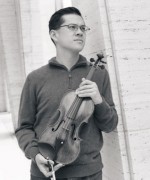Column Name
Title
Born and raised in San Diego, Calif., David Chan attended Harvard University, where he studied computer science for two years before changing course and earning a B.A. in music. He went on to study violin at Juilliard, where he received his master’s degree in 1997. David has been the concertmaster of the Metropolitan Opera Orchestra since 2000 and a Juilliard faculty member since 2005.
Body
When did you first know you wanted to be a musician and how did you come to know it?
During my high school years, a couple of positive summer musical experiences transformed music from a tolerable "mandatory" activity into something that I actively sought to learn more about. I developed an insatiable thirst to acquaint myself with as much repertoire as possible, not just violin music but also opera, symphonic, chamber, and piano music. By the end of college I had collected at least 120 complete opera recordings on CD—I guess it's only logical that I would end up with a career in the opera house.
Who was the teacher or mentor who most inspired you when you were growing up and what did you learn from that person?
My high school biology teacher, Barry Fogwell, who at one time had aspired to be a concert pianist, was a great source of inspiration to me. When I first met him, I had not yet found my real passion for music and was rather noncommittal about whether I would even continue the violin when I got to college. He thought I had a responsibility to pursue my talent, and his conviction made me think long and hard about that. Sadly, he passed away before he could hear me on the "big" stage.
What was the first recording that you remember hearing or buying? What was its significance to you?
As a child I heard many recordings by the great violinists, and these (especially Heifetz) undoubtedly shaped my listening ear. But a recording of Das Rheingold loaned to me by my high school biology teacher opened musical worlds previously unknown to me, among them the human voice and Wagner.
What's the most embarrassing moment you've had as a performer or in your career?
You have to have a short memory as a performer, like a relief pitcher in baseball. You're going to give up a game-winning home run now and then, but you have to just forget about it and move on. I've certainly made my share of minor gaffes, with or without an instrument in my hand. Luckily (knock on wood) I can't recall anything where I wanted to crawl under a rock and just die.
What are your non-music related interests or hobbies?
Wine and golf. I started my wine hobby about nine years ago with very broad tastes in wine, but in recent years I have concentrated mainly on Burgundy and Champagne. In fact, for two years now I have held a music and wine festival in Burgundy called Musique et Vin au Clos Vougeot—it is the perfect setting in which to celebrate these two great passions of mine. Golf, on the other hand, is something I picked up only a year ago, after moving to the suburbs. Since progress on the violin comes only slowly and painstakingly, if at all, at this point, it is refreshing to have an activity where any amount of practice leads to some kind of improvement.
If your students could only remember one thing from your teaching, what would you want it to be?
I would want them to remember that the violin is only the medium through which the music itself is expressed. Everything you learn about technique is merely a means to achieving that musical expression. And to take more chances—play less safe—in striving towards that goal. No one will remember a handful of dropped notes if you truly communicate something with your performance.
What book are you reading right now ... and what can you tell us about it?
The Bible. It keeps me grounded and is a daily reminder of what is important (and, perhaps more vitally, what is not important) in life.





